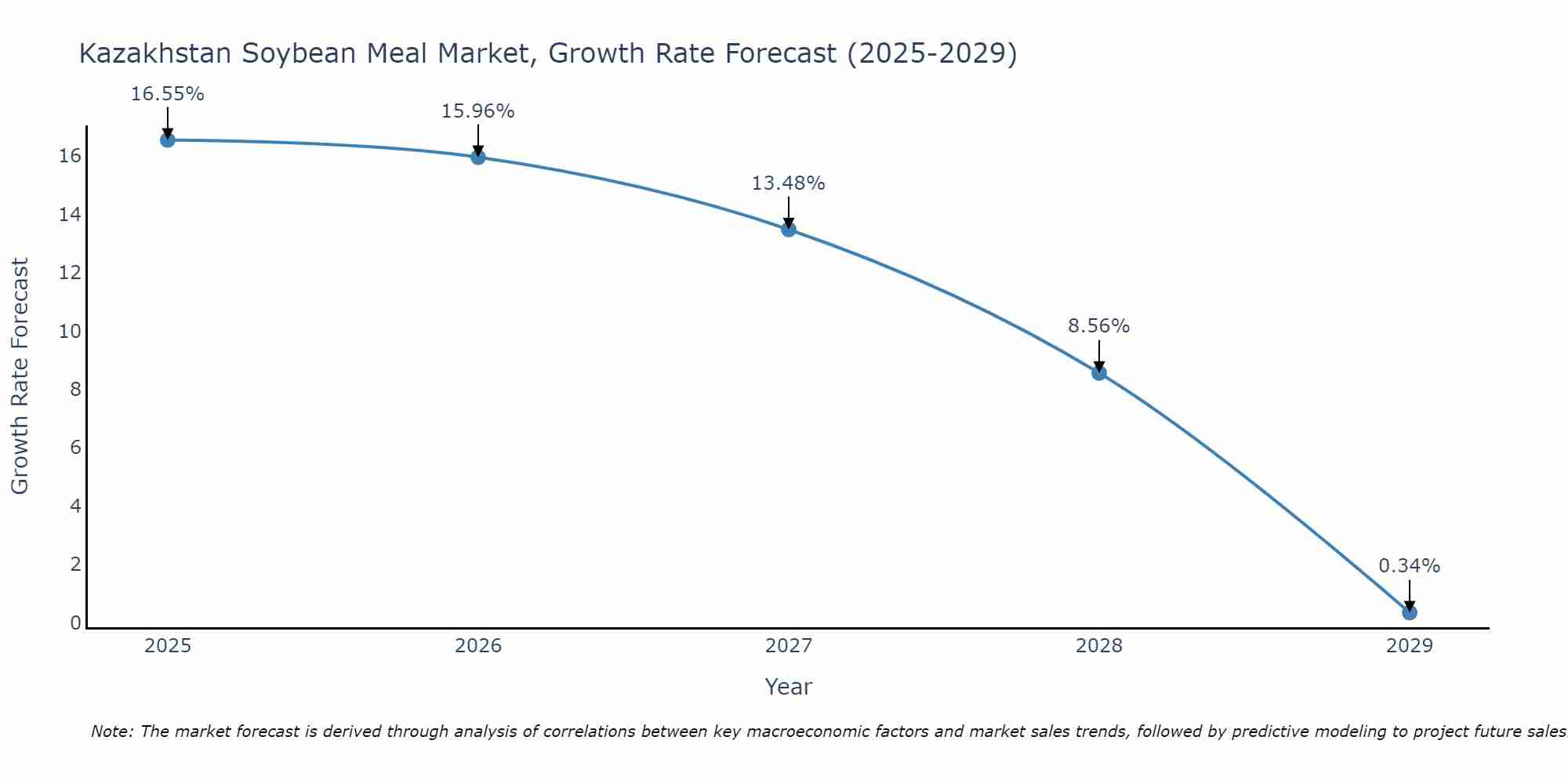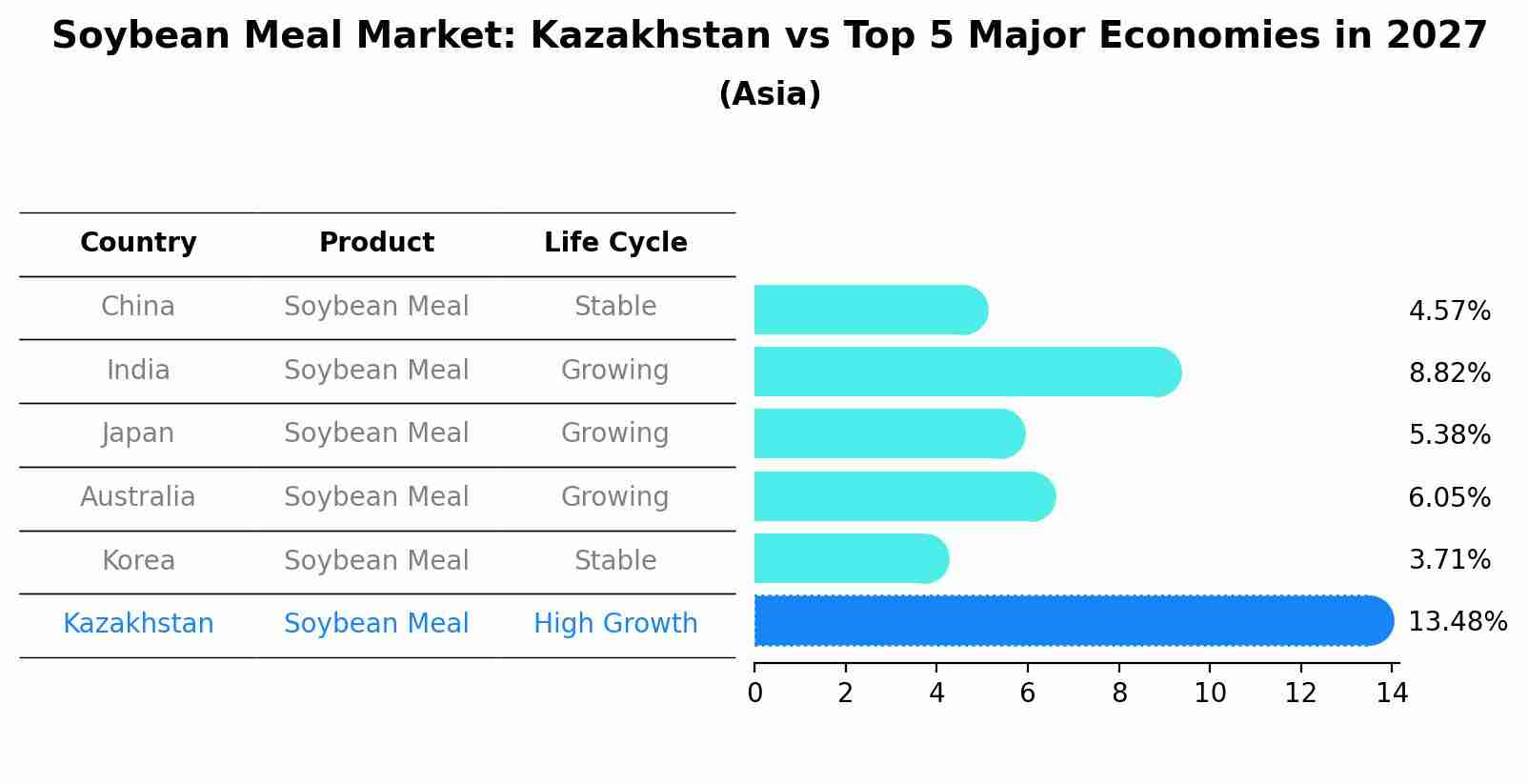Kazakhstan Soybean Meal Market Outlook | COVID-19 IMPACT, Share, Value, Forecast, Analysis, Trends, Companies, Revenue, Industry, Growth & Size
| Product Code: ETC385018 | Publication Date: Aug 2022 | Updated Date: Jul 2025 | Product Type: Market Research Report | |
| Publisher: 6Wresearch | Author: Summon Dutta | No. of Pages: 75 | No. of Figures: 35 | No. of Tables: 20 |
Kazakhstan Soybean Meal Market Size Growth Rate
The Kazakhstan Soybean Meal Market may undergo a gradual slowdown in growth rates between 2025 and 2029. Beginning strongly at 16.55% in 2025, growth softens to 0.34% in 2029.

Soybean Meal Market: Kazakhstan vs Top 5 Major Economies in 2027 (Asia)
By 2027, the Soybean Meal market in Kazakhstan is anticipated to reach a growth rate of 13.48%, as part of an increasingly competitive Asia region, where China remains at the forefront, supported by India, Japan, Australia and South Korea, driving innovations and market adoption across sectors.

Kazakhstan Soybean Meal Market Synopsis
The Kazakhstan Soybean Meal Market is witnessing steady growth driven by increasing demand from the livestock and poultry feed industries. Soybean meal, a byproduct of soybean oil extraction, is rich in protein and is widely used as a feed ingredient for livestock and poultry due to its nutritional value. The market is influenced by factors such as the expanding livestock industry, growing awareness about the benefits of soybean meal in animal nutrition, and the availability of raw materials for soybean cultivation in Kazakhstan. Key players in the market focus on product innovation, quality assurance, and strategic partnerships to strengthen their market position. However, challenges such as fluctuating prices of soybeans and competition from alternative protein sources could impact market growth in the coming years.
Kazakhstan Soybean Meal Market Trends
The Kazakhstan soybean meal market is experiencing a growth trend driven by increasing demand from the animal feed industry. Soybean meal is a key protein source for livestock feed, and with the rising demand for meat products in Kazakhstan, the need for soybean meal as a feed ingredient is also increasing. Additionally, the country`s efforts to expand its livestock industry and improve feed efficiency are further boosting the demand for soybean meal. The market is also witnessing a shift towards sustainable and high-quality feed ingredients, leading to an increased preference for soybean meal due to its nutritional benefits. Overall, the Kazakhstan soybean meal market is expected to continue on its growth trajectory in the coming years, driven by these factors.
Kazakhstan Soybean Meal Market Challenges
In the Kazakhstan soybean meal market, challenges include fluctuating global soybean prices affecting the cost of imports, limited domestic production capacity leading to heavy reliance on imports, and competition from other protein sources like sunflower meal. Additionally, logistics issues such as transportation costs and infrastructure limitations can impact the efficiency of distribution networks. Regulatory barriers and government policies related to agriculture and trade can also pose challenges for market participants. Overall, the Kazakhstan soybean meal market faces challenges related to cost fluctuations, supply chain efficiency, competition from alternative products, and regulatory constraints that can impact market dynamics and profitability for industry players.
Kazakhstan Soybean Meal Market Investment Opportunities
In the Kazakhstan soybean meal market, there are promising investment opportunities due to the country`s increasing livestock industry and growing demand for protein-rich animal feed. Investing in soybean meal production facilities or trading soybean meal futures can be lucrative options. Additionally, there is potential for vertical integration by investing in soybean cultivation to secure a stable supply of raw materials. The government`s focus on agricultural development and incentives for foreign investment further enhance the attractiveness of the market. However, it is essential to consider factors such as market competition, regulatory environment, and fluctuations in global soybean prices when evaluating investment opportunities in the Kazakhstan soybean meal market. Conducting thorough market research and risk analysis will be crucial for making informed investment decisions.
Jordan Agar Market Government Policies
The government of Kazakhstan has implemented policies to support the soybean meal market, aiming to increase domestic production and reduce reliance on imports. These policies include providing subsidies and incentives to farmers to encourage soybean cultivation, improving infrastructure for the transportation and storage of soybeans, and promoting research and development initiatives to enhance productivity and quality. Additionally, the government has established regulations to ensure the safety and quality of soybean meal products, as well as to promote transparency and fair competition in the market. Overall, these policies are geared towards boosting the growth of the Kazakhstan soybean meal industry and achieving self-sufficiency in production to meet domestic demand.
Kazakhstan Soybean Meal Market Future Outlook
The future outlook for the Kazakhstan Soybean Meal Market is promising due to increasing demand for protein-rich animal feed in the country`s growing livestock industry. With a focus on boosting domestic agricultural production and reducing dependency on imports, there is a growing interest in soybean meal as a cost-effective and high-quality feed ingredient. Kazakhstan`s favorable climate and vast agricultural land present opportunities for expanding soybean cultivation, leading to a more sustainable supply chain for soybean meal production. Additionally, the government`s support for agricultural modernization and technology adoption is expected to further drive the market growth. Overall, the Kazakhstan Soybean Meal Market is poised for steady expansion in the coming years, supported by favorable market conditions and increasing awareness of the benefits of soybean meal in animal nutrition.
Key Highlights of the Report:
- Kazakhstan Soybean Meal Market Outlook
- Market Size of Kazakhstan Soybean Meal Market, 2021
- Forecast of Kazakhstan Soybean Meal Market, 2031
- Historical Data and Forecast of Kazakhstan Soybean Meal Revenues & Volume for the Period 2018 - 2031
- Kazakhstan Soybean Meal Market Trend Evolution
- Kazakhstan Soybean Meal Market Drivers and Challenges
- Kazakhstan Soybean Meal Price Trends
- Kazakhstan Soybean Meal Porter's Five Forces
- Kazakhstan Soybean Meal Industry Life Cycle
- Historical Data and Forecast of Kazakhstan Soybean Meal Market Revenues & Volume By Application for the Period 2018 - 2031
- Historical Data and Forecast of Kazakhstan Soybean Meal Market Revenues & Volume By Animal Feed for the Period 2018 - 2031
- Historical Data and Forecast of Kazakhstan Soybean Meal Market Revenues & Volume By Food Industry for the Period 2018 - 2031
- Historical Data and Forecast of Kazakhstan Soybean Meal Market Revenues & Volume By Beverage for the Period 2018 - 2031
- Historical Data and Forecast of Kazakhstan Soybean Meal Market Revenues & Volume By Healthcare Products for the Period 2018 - 2031
- Kazakhstan Soybean Meal Import Export Trade Statistics
- Market Opportunity Assessment By Application
- Kazakhstan Soybean Meal Top Companies Market Share
- Kazakhstan Soybean Meal Competitive Benchmarking By Technical and Operational Parameters
- Kazakhstan Soybean Meal Company Profiles
- Kazakhstan Soybean Meal Key Strategic Recommendations
Frequently Asked Questions About the Market Study (FAQs):
- Single User License$ 1,995
- Department License$ 2,400
- Site License$ 3,120
- Global License$ 3,795
Search
Thought Leadership and Analyst Meet
Our Clients
Related Reports
- Canada Oil and Gas Market (2026-2032) | Share, Segmentation, Value, Industry, Trends, Forecast, Analysis, Size & Revenue, Growth, Competitive Landscape, Outlook, Companies
- Germany Breakfast Food Market (2026-2032) | Industry, Share, Growth, Size, Companies, Value, Analysis, Revenue, Trends, Forecast & Outlook
- Australia Briquette Market (2025-2031) | Growth, Size, Revenue, Forecast, Analysis, Trends, Value, Share, Industry & Companies
- Vietnam System Integrator Market (2025-2031) | Size, Companies, Analysis, Industry, Value, Forecast, Growth, Trends, Revenue & Share
- ASEAN and Thailand Brain Health Supplements Market (2025-2031) | Strategy, Consumer Insights, Analysis, Investment Trends, Opportunities, Growth, Size, Share, Industry, Revenue, Segments, Value, Segmentation, Supply, Forecast, Restraints, Outlook, Competition, Drivers, Trends, Demand, Pricing Analysis, Competitive, Strategic Insights, Companies, Challenges
- ASEAN Bearings Market (2025-2031) | Strategy, Consumer Insights, Analysis, Investment Trends, Opportunities, Growth, Size, Share, Industry, Revenue, Segments, Value, Segmentation, Supply, Forecast, Restraints, Outlook, Competition, Drivers, Trends, Demand, Pricing Analysis, Competitive, Strategic Insights, Companies, Challenges
- Europe Flooring Market (2025-2031) | Outlook, Share, Industry, Trends, Forecast, Companies, Revenue, Size, Analysis, Growth & Value
- Saudi Arabia Manlift Market (2025-2031) | Outlook, Size, Growth, Trends, Companies, Industry, Revenue, Value, Share, Forecast & Analysis
- Uganda Excavator, Crane, and Wheel Loaders Market (2025-2031) | Strategy, Consumer Insights, Analysis, Investment Trends, Opportunities, Growth, Size, Share, Industry, Revenue, Segments, Value, Segmentation, Supply, Forecast, Restraints, Outlook, Competition, Drivers, Trends, Demand, Pricing Analysis, Competitive, Strategic Insights, Companies, Challenges
- Rwanda Excavator, Crane, and Wheel Loaders Market (2025-2031) | Strategy, Consumer Insights, Analysis, Investment Trends, Opportunities, Growth, Size, Share, Industry, Revenue, Segments, Value, Segmentation, Supply, Forecast, Restraints, Outlook, Competition, Drivers, Trends, Demand, Pricing Analysis, Competitive, Strategic Insights, Companies, Challenges
Industry Events and Analyst Meet
Whitepaper
- Middle East & Africa Commercial Security Market Click here to view more.
- Middle East & Africa Fire Safety Systems & Equipment Market Click here to view more.
- GCC Drone Market Click here to view more.
- Middle East Lighting Fixture Market Click here to view more.
- GCC Physical & Perimeter Security Market Click here to view more.
6WResearch In News
- Doha a strategic location for EV manufacturing hub: IPA Qatar
- Demand for luxury TVs surging in the GCC, says Samsung
- Empowering Growth: The Thriving Journey of Bangladesh’s Cable Industry
- Demand for luxury TVs surging in the GCC, says Samsung
- Video call with a traditional healer? Once unthinkable, it’s now common in South Africa
- Intelligent Buildings To Smooth GCC’s Path To Net Zero


















